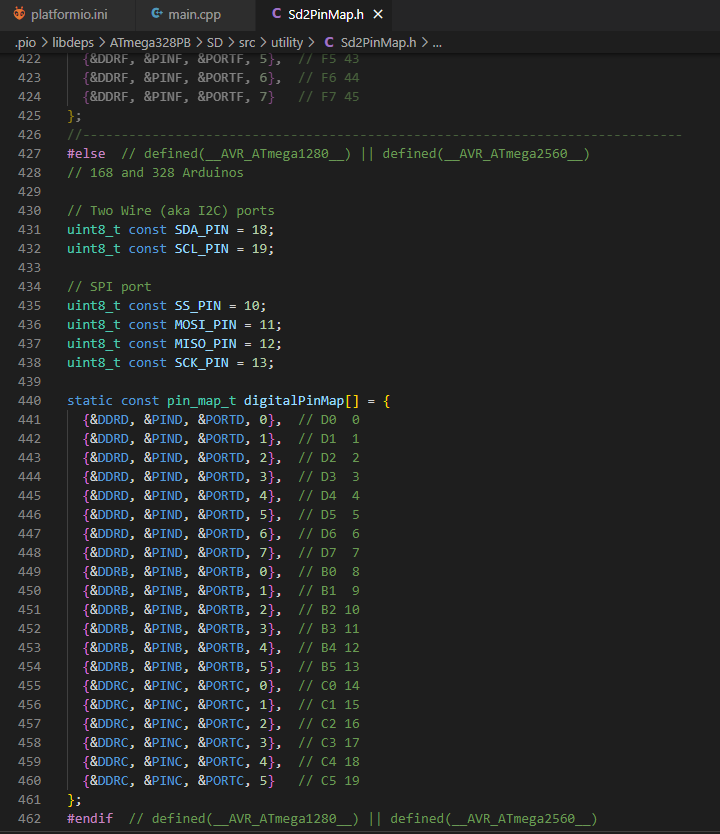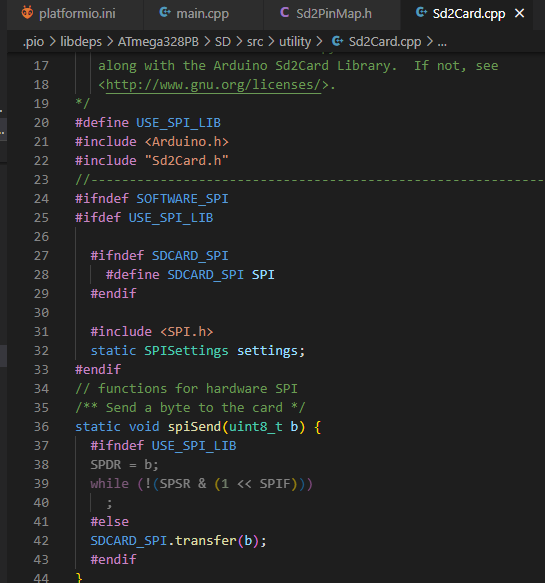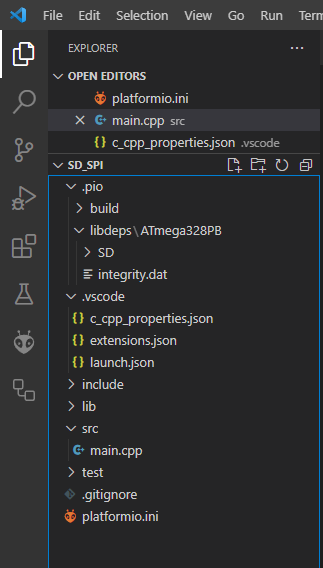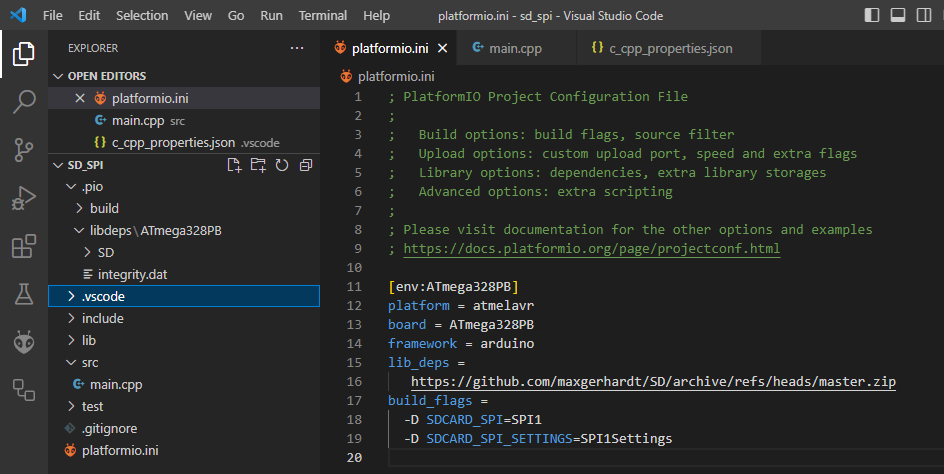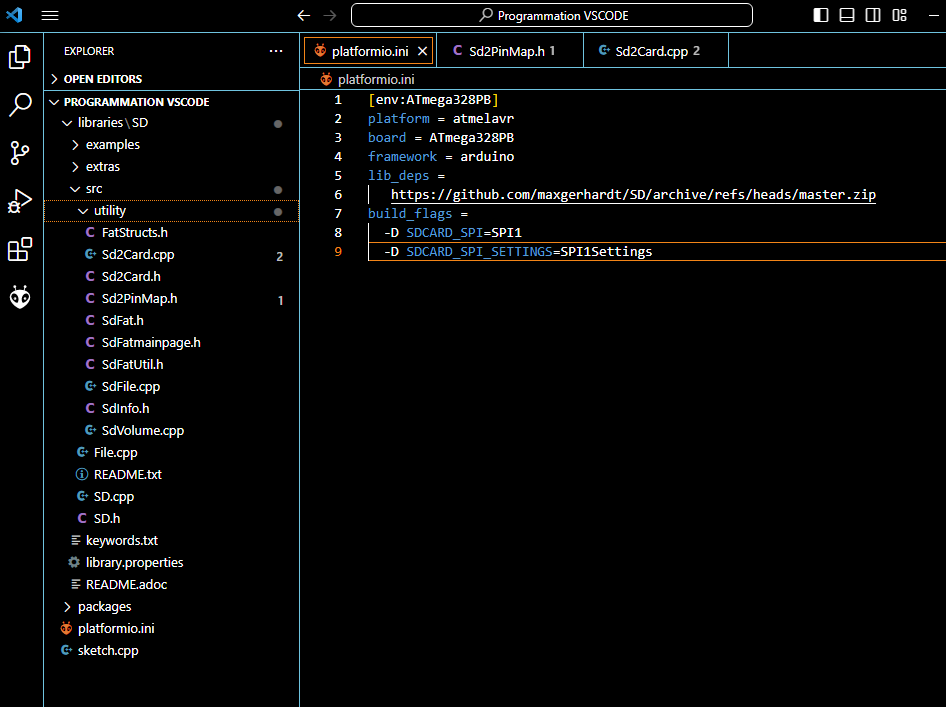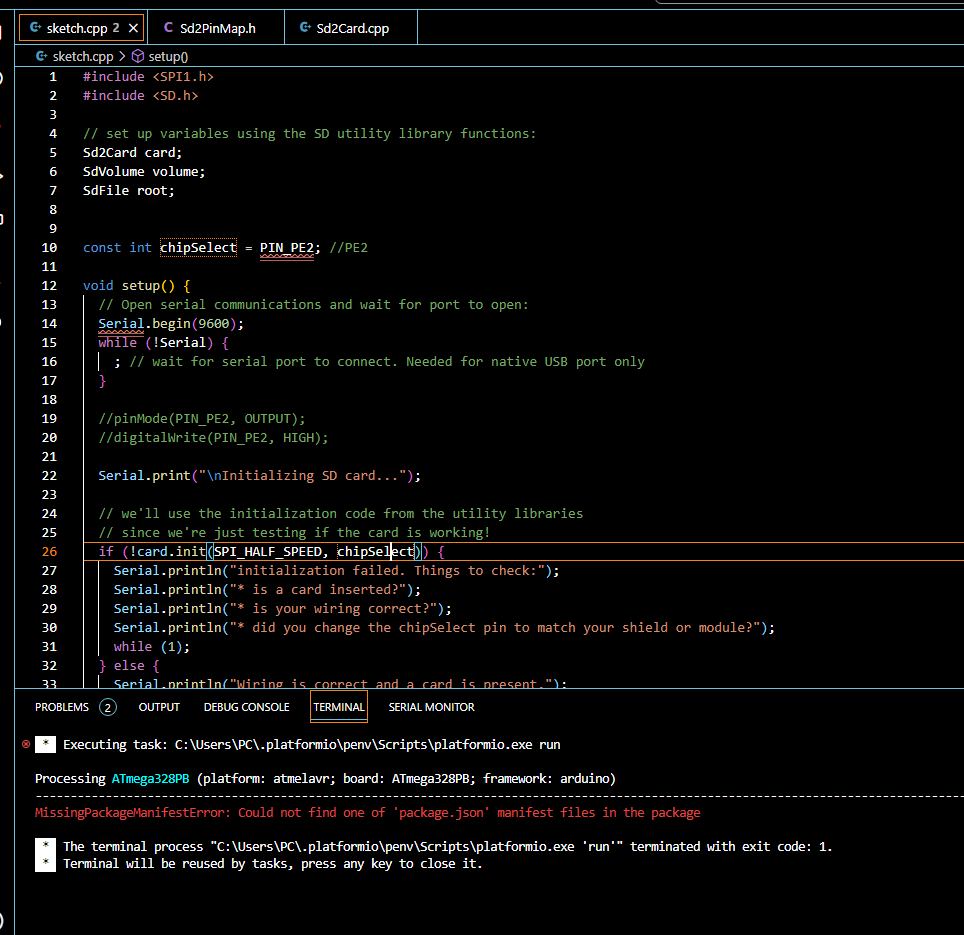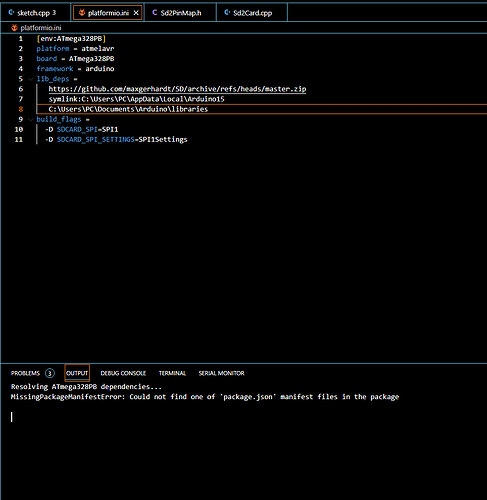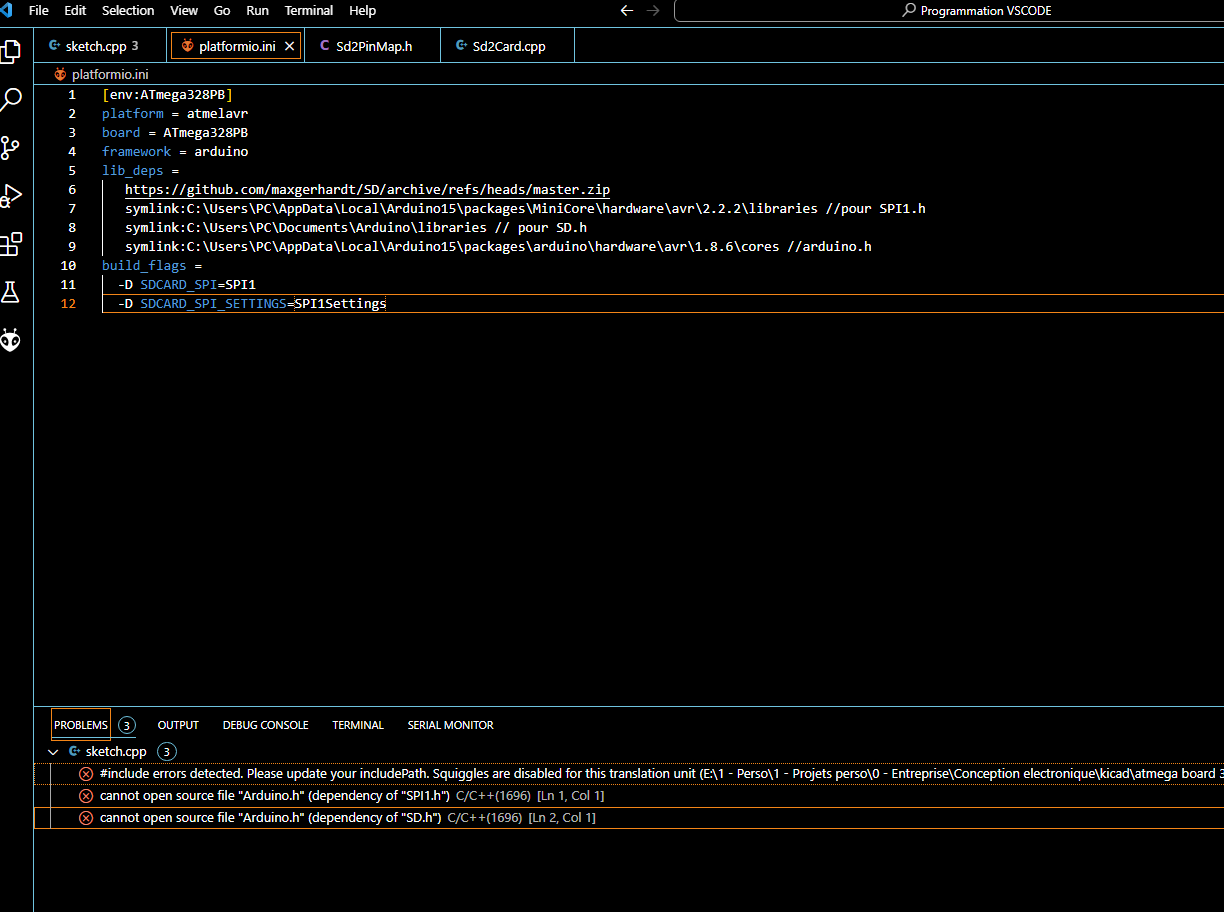This is the Sd2PinMap.h code
#if defined(__arm__) // Arduino Due Board follows
#ifndef Sd2PinMap_h
#define Sd2PinMap_h
#include <Arduino.h>
uint8_t const SS_PIN = SS;
uint8_t const MOSI_PIN = MOSI;
uint8_t const MISO_PIN = MISO;
uint8_t const SCK_PIN = SCK;
#endif // Sd2PinMap_h
#elif defined(__AVR_ATmega4809__) // Arduino UNO WiFI Rev2 follows
#ifndef Sd2PinMap_h
#define Sd2PinMap_h
#include <Arduino.h>
uint8_t const SS_PIN = SS;
uint8_t const MOSI_PIN = MOSI;
uint8_t const MISO_PIN = MISO;
uint8_t const SCK_PIN = SCK;
#endif // Sd2PinMap_h
#elif defined(__AVR__) // Other AVR based Boards follows
// Warning this file was generated by a program.
#ifndef Sd2PinMap_h
#define Sd2PinMap_h
#include <avr/io.h>
//------------------------------------------------------------------------------
/** struct for mapping digital pins */
struct pin_map_t {
volatile uint8_t* ddr;
volatile uint8_t* pin;
volatile uint8_t* port;
uint8_t bit;
};
//------------------------------------------------------------------------------
#if defined(__AVR_ATmega1280__) || defined(__AVR_ATmega2560__)
// Mega
// Two Wire (aka I2C) ports
uint8_t const SDA_PIN = 20;
uint8_t const SCL_PIN = 21;
// SPI port
uint8_t const SS_PIN = 53;
uint8_t const MOSI_PIN = 51;
uint8_t const MISO_PIN = 50;
uint8_t const SCK_PIN = 52;
static const pin_map_t digitalPinMap[] = {
{&DDRE, &PINE, &PORTE, 0}, // E0 0
{&DDRE, &PINE, &PORTE, 1}, // E1 1
{&DDRE, &PINE, &PORTE, 4}, // E4 2
{&DDRE, &PINE, &PORTE, 5}, // E5 3
{&DDRG, &PING, &PORTG, 5}, // G5 4
{&DDRE, &PINE, &PORTE, 3}, // E3 5
{&DDRH, &PINH, &PORTH, 3}, // H3 6
{&DDRH, &PINH, &PORTH, 4}, // H4 7
{&DDRH, &PINH, &PORTH, 5}, // H5 8
{&DDRH, &PINH, &PORTH, 6}, // H6 9
{&DDRB, &PINB, &PORTB, 4}, // B4 10
{&DDRB, &PINB, &PORTB, 5}, // B5 11
{&DDRB, &PINB, &PORTB, 6}, // B6 12
{&DDRB, &PINB, &PORTB, 7}, // B7 13
{&DDRJ, &PINJ, &PORTJ, 1}, // J1 14
{&DDRJ, &PINJ, &PORTJ, 0}, // J0 15
{&DDRH, &PINH, &PORTH, 1}, // H1 16
{&DDRH, &PINH, &PORTH, 0}, // H0 17
{&DDRD, &PIND, &PORTD, 3}, // D3 18
{&DDRD, &PIND, &PORTD, 2}, // D2 19
{&DDRD, &PIND, &PORTD, 1}, // D1 20
{&DDRD, &PIND, &PORTD, 0}, // D0 21
{&DDRA, &PINA, &PORTA, 0}, // A0 22
{&DDRA, &PINA, &PORTA, 1}, // A1 23
{&DDRA, &PINA, &PORTA, 2}, // A2 24
{&DDRA, &PINA, &PORTA, 3}, // A3 25
{&DDRA, &PINA, &PORTA, 4}, // A4 26
{&DDRA, &PINA, &PORTA, 5}, // A5 27
{&DDRA, &PINA, &PORTA, 6}, // A6 28
{&DDRA, &PINA, &PORTA, 7}, // A7 29
{&DDRC, &PINC, &PORTC, 7}, // C7 30
{&DDRC, &PINC, &PORTC, 6}, // C6 31
{&DDRC, &PINC, &PORTC, 5}, // C5 32
{&DDRC, &PINC, &PORTC, 4}, // C4 33
{&DDRC, &PINC, &PORTC, 3}, // C3 34
{&DDRC, &PINC, &PORTC, 2}, // C2 35
{&DDRC, &PINC, &PORTC, 1}, // C1 36
{&DDRC, &PINC, &PORTC, 0}, // C0 37
{&DDRD, &PIND, &PORTD, 7}, // D7 38
{&DDRG, &PING, &PORTG, 2}, // G2 39
{&DDRG, &PING, &PORTG, 1}, // G1 40
{&DDRG, &PING, &PORTG, 0}, // G0 41
{&DDRL, &PINL, &PORTL, 7}, // L7 42
{&DDRL, &PINL, &PORTL, 6}, // L6 43
{&DDRL, &PINL, &PORTL, 5}, // L5 44
{&DDRL, &PINL, &PORTL, 4}, // L4 45
{&DDRL, &PINL, &PORTL, 3}, // L3 46
{&DDRL, &PINL, &PORTL, 2}, // L2 47
{&DDRL, &PINL, &PORTL, 1}, // L1 48
{&DDRL, &PINL, &PORTL, 0}, // L0 49
{&DDRB, &PINB, &PORTB, 3}, // B3 50
{&DDRB, &PINB, &PORTB, 2}, // B2 51
{&DDRB, &PINB, &PORTB, 1}, // B1 52
{&DDRB, &PINB, &PORTB, 0}, // B0 53
{&DDRF, &PINF, &PORTF, 0}, // F0 54
{&DDRF, &PINF, &PORTF, 1}, // F1 55
{&DDRF, &PINF, &PORTF, 2}, // F2 56
{&DDRF, &PINF, &PORTF, 3}, // F3 57
{&DDRF, &PINF, &PORTF, 4}, // F4 58
{&DDRF, &PINF, &PORTF, 5}, // F5 59
{&DDRF, &PINF, &PORTF, 6}, // F6 60
{&DDRF, &PINF, &PORTF, 7}, // F7 61
{&DDRK, &PINK, &PORTK, 0}, // K0 62
{&DDRK, &PINK, &PORTK, 1}, // K1 63
{&DDRK, &PINK, &PORTK, 2}, // K2 64
{&DDRK, &PINK, &PORTK, 3}, // K3 65
{&DDRK, &PINK, &PORTK, 4}, // K4 66
{&DDRK, &PINK, &PORTK, 5}, // K5 67
{&DDRK, &PINK, &PORTK, 6}, // K6 68
{&DDRK, &PINK, &PORTK, 7} // K7 69
};
//------------------------------------------------------------------------------
#elif (defined(__AVR_ATmega644P__) || defined(__AVR_ATmega1284P__)) && defined(CORE_MICRODUINO)
// Microduino Core+
// Two Wire (aka I2C) ports
uint8_t const SDA_PIN = 20;
uint8_t const SCL_PIN = 21;
// SPI port
uint8_t const SS_PIN = 10;
uint8_t const MOSI_PIN = 11;
uint8_t const MISO_PIN = 12;
uint8_t const SCK_PIN = 13;
static const pin_map_t digitalPinMap[] = {
{&DDRD, &PIND, &PORTD, 0}, // D0 PD0
{&DDRD, &PIND, &PORTD, 1}, // D1 PD1
{&DDRD, &PIND, &PORTD, 2}, // D2 PD2
{&DDRD, &PIND, &PORTD, 3}, // D3 PD3
{&DDRB, &PINB, &PORTB, 0}, // D4 PB0
{&DDRB, &PINB, &PORTB, 1}, // D5 PB1
{&DDRB, &PINB, &PORTB, 2}, // D6 PB2
{&DDRB, &PINB, &PORTB, 3}, // D7 PB3
{&DDRD, &PIND, &PORTD, 6}, // D8 PD6
{&DDRD, &PIND, &PORTD, 5}, // D9 PD5
{&DDRB, &PINB, &PORTB, 4}, // D10 PB4
{&DDRB, &PINB, &PORTB, 5}, // D11 PB5
{&DDRB, &PINB, &PORTB, 6}, // D12 PB6
{&DDRB, &PINB, &PORTB, 7}, // D13 PB7
{&DDRC, &PINC, &PORTC, 7}, // D14 PC7
{&DDRC, &PINC, &PORTC, 6}, // D15 PC6
{&DDRC, &PINC, &PORTC, 5}, // D16 PC5
{&DDRC, &PINC, &PORTC, 4}, // D17 PC4
{&DDRC, &PINC, &PORTC, 3}, // D18 PC3
{&DDRC, &PINC, &PORTC, 2}, // D19 PC2
{&DDRC, &PINC, &PORTC, 1}, // D20 PC1
{&DDRC, &PINC, &PORTC, 0}, // D21 PC0
{&DDRD, &PIND, &PORTD, 4}, // D22 PD4
{&DDRD, &PIND, &PORTD, 7}, // D23 PD7
{&DDRA, &PINA, &PORTA, 7}, // D24 PA7
{&DDRA, &PINA, &PORTA, 6}, // D25 PA6
{&DDRA, &PINA, &PORTA, 5}, // D26 PA5
{&DDRA, &PINA, &PORTA, 4}, // D27 PA4
{&DDRA, &PINA, &PORTA, 3}, // D28 PA3
{&DDRA, &PINA, &PORTA, 2}, // D29 PA2
{&DDRA, &PINA, &PORTA, 1}, // D30 PA1
{&DDRA, &PINA, &PORTA, 0} // D31 PA0
};
//------------------------------------------------------------------------------
#elif defined(__AVR_ATmega128RFA1__) && defined(CORE_MICRODUINO)
// Microduino Core RF
// Two Wire (aka I2C) ports
uint8_t const SDA_PIN = 18;
uint8_t const SCL_PIN = 19;
// SPI port
uint8_t const SS_PIN = 10;
uint8_t const MOSI_PIN = 11;
uint8_t const MISO_PIN = 12;
uint8_t const SCK_PIN = 13;
static const pin_map_t digitalPinMap[] = {
{&DDRD, &PINE, &PORTE, 0}, // D0 PE0
{&DDRD, &PINE, &PORTE, 1}, // D1 PE1
{&DDRD, &PIND, &PORTD, 2}, // D2 PD2
{&DDRD, &PIND, &PORTD, 3}, // D3 PD3
{&DDRB, &PINE, &PORTE, 3}, // D4 PE3
{&DDRB, &PINE, &PORTE, 4}, // D5 PE4
{&DDRB, &PINE, &PORTE, 5}, // D6 PE5
{&DDRB, &PINB, &PORTB, 7}, // D7 PB7
{&DDRD, &PINB, &PORTB, 6}, // D8 PB6
{&DDRD, &PINB, &PORTB, 5}, // D9 PB5
{&DDRB, &PINB, &PORTB, 4}, // D10 PB4
{&DDRB, &PINB, &PORTB, 2}, // D11 PB2
{&DDRB, &PINB, &PORTB, 3}, // D12 PB3
{&DDRB, &PINB, &PORTB, 1}, // D13 PB1
{&DDRF, &PINF, &PORTF, 7}, // D14 PF7
{&DDRF, &PINF, &PORTF, 6}, // D15 PF6
{&DDRF, &PINF, &PORTF, 5}, // D16 PF5
{&DDRF, &PINF, &PORTF, 4}, // D17 PF4
{&DDRD, &PIND, &PORTD, 1}, // D18 PD1
{&DDRD, &PIND, &PORTD, 0}, // D19 PD0
{&DDRF, &PINF, &PORTF, 3}, // D20 PF3
{&DDRF, &PINF, &PORTF, 2}, // D21 PF2
};
//------------------------------------------------------------------------------
#elif defined(__AVR_ATmega32U4__) && defined(CORE_MICRODUINO)
// Microduino Core USB
// Two Wire (aka I2C) ports
uint8_t const SDA_PIN = 18;
uint8_t const SCL_PIN = 19;
// SPI port
uint8_t const SS_PIN = 10;
uint8_t const MOSI_PIN = 11;
uint8_t const MISO_PIN = 12;
uint8_t const SCK_PIN = 13;
static const pin_map_t digitalPinMap[] = {
{&DDRD, &PIND, &PORTD, 2}, // D0 - PD2
{&DDRD, &PIND, &PORTD, 3}, // D1 - PD3
{&DDRE, &PINE, &PORTE, 6}, // D2 - PE6
{&DDRD, &PIND, &PORTD, 6}, // D3 - PD6
{&DDRD, &PIND, &PORTD, 7}, // D4 - PD7
{&DDRC, &PINC, &PORTC, 6}, // D5 - PC6
{&DDRC, &PINC, &PORTC, 7}, // D6 - PC7
{&DDRE, &PINE, &PORTE, 7}, // D7 - PE7
{&DDRB, &PINB, &PORTB, 6}, // D8 - PB6
{&DDRB, &PINB, &PORTB, 5}, // D9 - PB5
{&DDRB, &PINB, &PORTB, 0}, // D10 - PB0
{&DDRB, &PINB, &PORTB, 2}, // D11 - MOSI - PB2
{&DDRB, &PINB, &PORTB, 3}, // D12 -MISO - PB3
{&DDRB, &PINB, &PORTB, 1}, // D13 -SCK - PB1
{&DDRF, &PINF, &PORTF, 7}, // D14 - A0 - PF7
{&DDRF, &PINF, &PORTF, 6}, // D15 - A1 - PF6
{&DDRF, &PINF, &PORTF, 5}, // D16 - A2 - PF5
{&DDRF, &PINF, &PORTF, 4}, // D17 - A3 - PF4
{&DDRD, &PIND, &PORTD, 1}, // D18 - PD1
{&DDRD, &PIND, &PORTD, 0}, // D19 - PD0
{&DDRF, &PINF, &PORTF, 1}, // D20 - A6 - PF1
{&DDRF, &PINF, &PORTF, 0}, // D21 - A7 - PF0
};
//------------------------------------------------------------------------------
#elif defined(__AVR_ATmega644P__) || defined(__AVR_ATmega644__)
// Sanguino
// Two Wire (aka I2C) ports
uint8_t const SDA_PIN = 17;
uint8_t const SCL_PIN = 18;
// SPI port
uint8_t const SS_PIN = 4;
uint8_t const MOSI_PIN = 5;
uint8_t const MISO_PIN = 6;
uint8_t const SCK_PIN = 7;
static const pin_map_t digitalPinMap[] = {
{&DDRB, &PINB, &PORTB, 0}, // B0 0
{&DDRB, &PINB, &PORTB, 1}, // B1 1
{&DDRB, &PINB, &PORTB, 2}, // B2 2
{&DDRB, &PINB, &PORTB, 3}, // B3 3
{&DDRB, &PINB, &PORTB, 4}, // B4 4
{&DDRB, &PINB, &PORTB, 5}, // B5 5
{&DDRB, &PINB, &PORTB, 6}, // B6 6
{&DDRB, &PINB, &PORTB, 7}, // B7 7
{&DDRD, &PIND, &PORTD, 0}, // D0 8
{&DDRD, &PIND, &PORTD, 1}, // D1 9
{&DDRD, &PIND, &PORTD, 2}, // D2 10
{&DDRD, &PIND, &PORTD, 3}, // D3 11
{&DDRD, &PIND, &PORTD, 4}, // D4 12
{&DDRD, &PIND, &PORTD, 5}, // D5 13
{&DDRD, &PIND, &PORTD, 6}, // D6 14
{&DDRD, &PIND, &PORTD, 7}, // D7 15
{&DDRC, &PINC, &PORTC, 0}, // C0 16
{&DDRC, &PINC, &PORTC, 1}, // C1 17
{&DDRC, &PINC, &PORTC, 2}, // C2 18
{&DDRC, &PINC, &PORTC, 3}, // C3 19
{&DDRC, &PINC, &PORTC, 4}, // C4 20
{&DDRC, &PINC, &PORTC, 5}, // C5 21
{&DDRC, &PINC, &PORTC, 6}, // C6 22
{&DDRC, &PINC, &PORTC, 7}, // C7 23
{&DDRA, &PINA, &PORTA, 7}, // A7 24
{&DDRA, &PINA, &PORTA, 6}, // A6 25
{&DDRA, &PINA, &PORTA, 5}, // A5 26
{&DDRA, &PINA, &PORTA, 4}, // A4 27
{&DDRA, &PINA, &PORTA, 3}, // A3 28
{&DDRA, &PINA, &PORTA, 2}, // A2 29
{&DDRA, &PINA, &PORTA, 1}, // A1 30
{&DDRA, &PINA, &PORTA, 0} // A0 31
};
//------------------------------------------------------------------------------
#elif defined(__AVR_ATmega32U4__)
// Leonardo
// Two Wire (aka I2C) ports
uint8_t const SDA_PIN = 2;
uint8_t const SCL_PIN = 3;
// SPI port
uint8_t const SS_PIN = 17;
uint8_t const MOSI_PIN = 16;
uint8_t const MISO_PIN = 14;
uint8_t const SCK_PIN = 15;
static const pin_map_t digitalPinMap[] = {
{&DDRD, &PIND, &PORTD, 2}, // D2 0
{&DDRD, &PIND, &PORTD, 3}, // D3 1
{&DDRD, &PIND, &PORTD, 1}, // D1 2
{&DDRD, &PIND, &PORTD, 0}, // D0 3
{&DDRD, &PIND, &PORTD, 4}, // D4 4
{&DDRC, &PINC, &PORTC, 6}, // C6 5
{&DDRD, &PIND, &PORTD, 7}, // D7 6
{&DDRE, &PINE, &PORTE, 6}, // E6 7
{&DDRB, &PINB, &PORTB, 4}, // B4 8
{&DDRB, &PINB, &PORTB, 5}, // B5 9
{&DDRB, &PINB, &PORTB, 6}, // B6 10
{&DDRB, &PINB, &PORTB, 7}, // B7 11
{&DDRD, &PIND, &PORTD, 6}, // D6 12
{&DDRC, &PINC, &PORTC, 7}, // C7 13
{&DDRB, &PINB, &PORTB, 3}, // B3 14
{&DDRB, &PINB, &PORTB, 1}, // B1 15
{&DDRB, &PINB, &PORTB, 2}, // B2 16
{&DDRB, &PINB, &PORTB, 0}, // B0 17
{&DDRF, &PINF, &PORTF, 7}, // F7 18
{&DDRF, &PINF, &PORTF, 6}, // F6 19
{&DDRF, &PINF, &PORTF, 5}, // F5 20
{&DDRF, &PINF, &PORTF, 4}, // F4 21
{&DDRF, &PINF, &PORTF, 1}, // F1 22
{&DDRF, &PINF, &PORTF, 0}, // F0 23
};
//------------------------------------------------------------------------------
#elif defined(__AVR_AT90USB646__) || defined(__AVR_AT90USB1286__)
// Teensy++ 1.0 & 2.0
// Two Wire (aka I2C) ports
uint8_t const SDA_PIN = 1;
uint8_t const SCL_PIN = 0;
// SPI port
uint8_t const SS_PIN = 20;
uint8_t const MOSI_PIN = 22;
uint8_t const MISO_PIN = 23;
uint8_t const SCK_PIN = 21;
static const pin_map_t digitalPinMap[] = {
{&DDRD, &PIND, &PORTD, 0}, // D0 0
{&DDRD, &PIND, &PORTD, 1}, // D1 1
{&DDRD, &PIND, &PORTD, 2}, // D2 2
{&DDRD, &PIND, &PORTD, 3}, // D3 3
{&DDRD, &PIND, &PORTD, 4}, // D4 4
{&DDRD, &PIND, &PORTD, 5}, // D5 5
{&DDRD, &PIND, &PORTD, 6}, // D6 6
{&DDRD, &PIND, &PORTD, 7}, // D7 7
{&DDRE, &PINE, &PORTE, 0}, // E0 8
{&DDRE, &PINE, &PORTE, 1}, // E1 9
{&DDRC, &PINC, &PORTC, 0}, // C0 10
{&DDRC, &PINC, &PORTC, 1}, // C1 11
{&DDRC, &PINC, &PORTC, 2}, // C2 12
{&DDRC, &PINC, &PORTC, 3}, // C3 13
{&DDRC, &PINC, &PORTC, 4}, // C4 14
{&DDRC, &PINC, &PORTC, 5}, // C5 15
{&DDRC, &PINC, &PORTC, 6}, // C6 16
{&DDRC, &PINC, &PORTC, 7}, // C7 17
{&DDRE, &PINE, &PORTE, 6}, // E6 18
{&DDRE, &PINE, &PORTE, 7}, // E7 19
{&DDRB, &PINB, &PORTB, 0}, // B0 20
{&DDRB, &PINB, &PORTB, 1}, // B1 21
{&DDRB, &PINB, &PORTB, 2}, // B2 22
{&DDRB, &PINB, &PORTB, 3}, // B3 23
{&DDRB, &PINB, &PORTB, 4}, // B4 24
{&DDRB, &PINB, &PORTB, 5}, // B5 25
{&DDRB, &PINB, &PORTB, 6}, // B6 26
{&DDRB, &PINB, &PORTB, 7}, // B7 27
{&DDRA, &PINA, &PORTA, 0}, // A0 28
{&DDRA, &PINA, &PORTA, 1}, // A1 29
{&DDRA, &PINA, &PORTA, 2}, // A2 30
{&DDRA, &PINA, &PORTA, 3}, // A3 31
{&DDRA, &PINA, &PORTA, 4}, // A4 32
{&DDRA, &PINA, &PORTA, 5}, // A5 33
{&DDRA, &PINA, &PORTA, 6}, // A6 34
{&DDRA, &PINA, &PORTA, 7}, // A7 35
{&DDRE, &PINE, &PORTE, 4}, // E4 36
{&DDRE, &PINE, &PORTE, 5}, // E5 37
{&DDRF, &PINF, &PORTF, 0}, // F0 38
{&DDRF, &PINF, &PORTF, 1}, // F1 39
{&DDRF, &PINF, &PORTF, 2}, // F2 40
{&DDRF, &PINF, &PORTF, 3}, // F3 41
{&DDRF, &PINF, &PORTF, 4}, // F4 42
{&DDRF, &PINF, &PORTF, 5}, // F5 43
{&DDRF, &PINF, &PORTF, 6}, // F6 44
{&DDRF, &PINF, &PORTF, 7} // F7 45
};
//------------------------------------------------------------------------------
#else // defined(__AVR_ATmega1280__) || defined(__AVR_ATmega2560__)
// 168 and 328 Arduinos
// Two Wire (aka I2C) ports
uint8_t const SDA_PIN = 18;
uint8_t const SCL_PIN = 19;
// SPI port
uint8_t const SS_PIN = 10;
uint8_t const MOSI_PIN = 11;
uint8_t const MISO_PIN = 12;
uint8_t const SCK_PIN = 13;
static const pin_map_t digitalPinMap[] = {
{&DDRD, &PIND, &PORTD, 0}, // D0 0
{&DDRD, &PIND, &PORTD, 1}, // D1 1
{&DDRD, &PIND, &PORTD, 2}, // D2 2
{&DDRD, &PIND, &PORTD, 3}, // D3 3
{&DDRD, &PIND, &PORTD, 4}, // D4 4
{&DDRD, &PIND, &PORTD, 5}, // D5 5
{&DDRD, &PIND, &PORTD, 6}, // D6 6
{&DDRD, &PIND, &PORTD, 7}, // D7 7
{&DDRB, &PINB, &PORTB, 0}, // B0 8
{&DDRB, &PINB, &PORTB, 1}, // B1 9
{&DDRB, &PINB, &PORTB, 2}, // B2 10
{&DDRB, &PINB, &PORTB, 3}, // B3 11
{&DDRB, &PINB, &PORTB, 4}, // B4 12
{&DDRB, &PINB, &PORTB, 5}, // B5 13
{&DDRC, &PINC, &PORTC, 0}, // C0 14
{&DDRC, &PINC, &PORTC, 1}, // C1 15
{&DDRC, &PINC, &PORTC, 2}, // C2 16
{&DDRC, &PINC, &PORTC, 3}, // C3 17
{&DDRC, &PINC, &PORTC, 4}, // C4 18
{&DDRC, &PINC, &PORTC, 5} // C5 19
};
#endif // defined(__AVR_ATmega1280__) || defined(__AVR_ATmega2560__)
//------------------------------------------------------------------------------
static const uint8_t digitalPinCount = sizeof(digitalPinMap) / sizeof(pin_map_t);
uint8_t badPinNumber(void)
__attribute__((error("Pin number is too large or not a constant")));
static inline __attribute__((always_inline))
uint8_t getPinMode(uint8_t pin) {
if (__builtin_constant_p(pin) && pin < digitalPinCount) {
return (*digitalPinMap[pin].ddr >> digitalPinMap[pin].bit) & 1;
} else {
return badPinNumber();
}
}
static inline __attribute__((always_inline))
void setPinMode(uint8_t pin, uint8_t mode) {
if (__builtin_constant_p(pin) && pin < digitalPinCount) {
if (mode) {
*digitalPinMap[pin].ddr |= 1 << digitalPinMap[pin].bit;
} else {
*digitalPinMap[pin].ddr &= ~(1 << digitalPinMap[pin].bit);
}
} else {
badPinNumber();
}
}
static inline __attribute__((always_inline))
uint8_t fastDigitalRead(uint8_t pin) {
if (__builtin_constant_p(pin) && pin < digitalPinCount) {
return (*digitalPinMap[pin].pin >> digitalPinMap[pin].bit) & 1;
} else {
return badPinNumber();
}
}
static inline __attribute__((always_inline))
void fastDigitalWrite(uint8_t pin, uint8_t value) {
if (__builtin_constant_p(pin) && pin < digitalPinCount) {
if (value) {
*digitalPinMap[pin].port |= 1 << digitalPinMap[pin].bit;
} else {
*digitalPinMap[pin].port &= ~(1 << digitalPinMap[pin].bit);
}
} else {
badPinNumber();
}
}
#endif // Sd2PinMap_h
#elif defined (__CPU_ARC__)
#if defined (__ARDUINO_ARC__)
// Two Wire (aka I2C) ports
uint8_t const SDA_PIN = 18;
uint8_t const SCL_PIN = 19;
// SPI port
uint8_t const SS_PIN = 10;
uint8_t const MOSI_PIN = 11;
uint8_t const MISO_PIN = 12;
uint8_t const SCK_PIN = 13;
#endif // Arduino ARC
#else
#error Architecture or board not supported.
#endif
